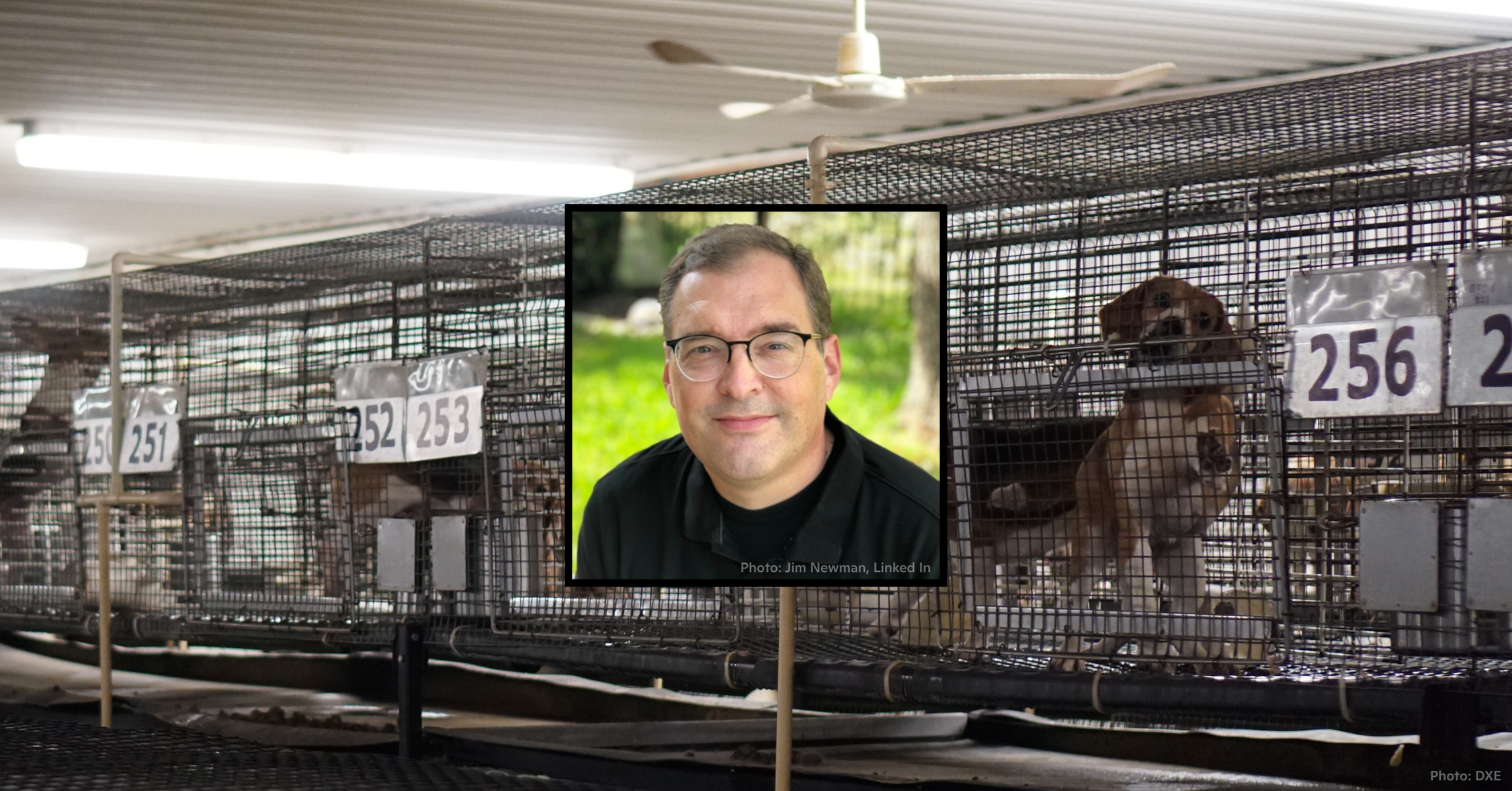
As embattled dog breeder Ridglan Farms faces mounting legal scrutiny, political condemnation, and community backlash, its allies in the animal research industry are stepping in to help (re)shape the public narrative.
Among them is Jim Newman, a longtime industry communications strategist who served as Director of Strategic Communications for Americans for Medical Progress (AMP), a group widely recognized as one of the animal research industry’s most aggressive propaganda machines.
Newman, who was paid six figures by AMP in 2021, recently began identifying himself as a “representative for Ridglan Farms.”
In other words: one of the animal research industry’s most seasoned spin doctors is now working to rehabilitate the image of one of its most disgraced actors.
Newman’s resume spans decades of service to the industry. In addition to six years at AMP, he spent two years as the Associate Director for Media Relations at the MD Anderson Cancer Center, and 14 years in a similar role at the Oregon Health & Science University.
Though he no longer appears to be on AMP’s payroll, Newman has not strayed far from its mission. His recent public statements on Ridglan’s behalf echo the same talking points he honed during his employment with AMP.
Instead of addressing the state’s ongoing animal cruelty investigation into Ridglan or the 311 regulatory violations documented by state inspectors — including untrained staff performing invasive surgeries on dogs without pain relief, anesthesia, or follow-up care — Newman attempted to deflect and redirect.

Newman pointed to federal USDA inspection reports that conveniently failed to document these same violations. He offered no explanation for the discrepancies, and he didn’t need to — for someone who has spent his career shaping narratives for the industry, USDA reports serve their purpose: they obscure more than they reveal, and they can often provide a convenient alternative to confronting the facts.
Newman also recycled one of the industry’s most familiar refrains: that animal research is responsible for modern medical breakthroughs. That line — aside from being flatly debunked — has no bearing on the matter at hand.
The state’s investigation into Ridglan is not about research protocols. It’s about basic animal care — it’s about dogs mutilated by untrained staff, denied treatment, and left to suffer.
For legal purposes, the distinction matters, and Newman’s refusal to engage with it speaks volumes.
Newman’s involvement here is not surprising. And, his strategy is even less so: when the animal research industry is under fire, its response is predictably to deflect and redirect.
And, Newman is not alone in this effort.
In a recent FOX6 interview spurred by happenings involving Ridglan, AMP’s Executive Director (and Newman’s former boss) Paula Clifford also weighed in. While reaffirming AMP’s support for animal research, Clifford insisted that AMP would “100%” not support “any place that would mistreat animals.”
It’s a bold claim for an organization founded to defend institutions that exist to — by design, and by definition — mistreat animals.
The Cambridge Dictionary defines “mistreat” as treating someone “badly, cruelly, or unfairly.” That definition applies not only to the conduct documented at Ridglan, but also to the very foundation of animal research itself: the breeding, confinement, exploitation, harming, and killing of animals for human ends.
Clifford’s statement — “[m]istreatment is never, never ok” — rings completely hollow in the face of AMP’s record, Newman’s rhetoric, and the industry’s very existence.
The reality is that, in the animal research industry, mistreatment is considered “never ok” only when it’s admitted publicly — not when it’s happening behind closed doors (under the banner of “science”) and someone’s being paid to excuse it.
Ridglan is under pressure. State investigators are poking around. Local government is pushing for answers. The media is covering developments as they unfold. Public anger is building.
And, in response, the animal research industry is doing what it has always done: deploying professional communicators to shield those who harm animals from scrutiny and prevent the public from seeing — and believing — the truth.
But this story doesn’t belong to Newman, AMP, or the industry they represent.
It belongs to the dogs whose suffering has forced Ridglan into the spotlight.
It belongs to the humans demanding justice for the industry’s victims.
It belongs to the public, which deserves facts — not spin.
And it belongs to all of us who refuse to mistake propaganda for truth.
Share this article on X or Bluesky.
Or copy, paste, and share this link anywhere else:
riseforanimals.org/news/ridglan-propaganda/